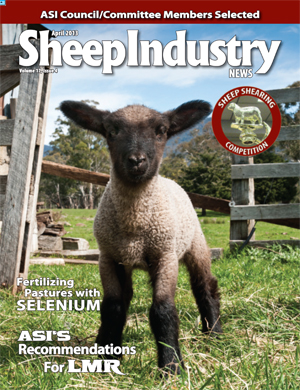
- April 2013
- Elite Sheep Shearers Compete at Stock Show
- USDA Releases Sheep 2011 Part II Report: Marketing and Death Loss
- ASI’s Recommendations for Mandatory Price Reporting
- 2013 ASI Council and Committee Members
- H-2A Working Group Meets to Discuss Program
- Fertilizing Pastures with Selenium, Best Way to get It to Livestock
- News from the Resource Council
- Installation Highlights Beauty of Wool
- Western Section of the American Society of Animal Science (WSASAS) Sheep Symposium
H-2A Working Group Meets to Discuss Program
By JUDY MALONE
ASI Director of Industry Information
(April 1, 2013) On any given day in America there are well over a thousand men herding sheep full time. In fact, hundreds of sheep ranches depend on herders to protect the sheep and manage grazing. Nationally, it is estimated one third of all production is under herders’ care. Nearly all the sheepherders are from Chile, Mexico and Peru and come to the United States on a temporary basis under the federal H-2A sheepherder program.
As a federal labor program administered by the U.S. Department of Labor with an additional role of Homeland Security, the H-2A program will be a primary topic in immigration reform legislation to be considered by the United States Senate and House of Representatives this Congress.
In order to support the sheepherder program in immigration legislation, three sheep industry groups met the end of February to discuss a legislative strategy to protect and to codify the H-2A sheep language that has benefitted the industry for over the last 60 years.
“Sheep producers have been doing it correctly for many years,” says Peter Orwick, American Sheep Industry Association (ASI) executive director. “They have been spending the money and filing the paperwork needed to keep their workers legal. Sheep ranchers are one of the few categories of agricultural workers that make the investment to maintain legal and documented workers.”
Herder wages alone easily add up to $14 million a year. When room, board and other costs are included, sheep producers are incurring as much as $20 million annually as their investment in sheepherders.
“The industry has been short American workers for sheepherding since World War II, therefore, the industry developed a number of provisions over the decades that make the H-2A program work,” adds Orwick. “Other industries actually mention the sheep industry provisions when they discuss the need for an effective immigrant labor program.”
Representatives of ASI, Mountain Plains Agriculture Service and Western Range Association gathered in Denver, Colo., on Feb. 27 to amass the technical resources of the organizations. ASI lobbies on behalf of sheep producers and the labor organizations work on behalf of the producers to line up the herders, process the legal paperwork and serve as a conduit with the federal government. Proprietary communications were shared amongst participants in an effort to gather necessary information to draft relevant sheep industry language for inclusion in a workable immigration bill.
ASI President Clint Krebs expressed, “All three organizations agreed during the ASI convention that 2013 is a critical year and that our industry must be prepared to be part of the federal legislation. Each group has a major stake in the outcome and it is rewarding that the organization presidents and a designee have agreed to serve on this legislative committee specific to immigration reform.
“The industry greatly appreciates the commitment of U.S. Sen. Mike Enzi of Wyoming to lead the legislative effort to support continuing the sheepherder program. As a member of the Senate Judiciary Committee, which is expected to address the immigration legislation, the sheep industry is fortunate to have Enzi’s leadership to ensure we have an appropriate sheepherder program in statute.”
According to Orwick, Enzi has worked with the Committee Chair Sen. Patrick Leahy of Vermont in prior years on legislation to provide H-2A for the sheep and dairy industries.
Krebs adds, “It is critical that we have language prepared and supporters in Congress ready to help us ensure our program is part of the final immigration legislation. This legislative committee is key to assuring that all three organizations are communicating in unison with Congress and the industry. We expect to issue legislative briefings for producers to use in meetings with their congressional delegation and, obviously, the May trip to Washington, D.C., will be a key event on this issue.”
Western Range Association is headquartered in Salt Lake City, Utah, and Mountain Plains Agriculture Service offices in Casper, Wyo., each has 800 or more herders in the H-2A program and work directly with hundreds of sheep and livestock operations annually.
The sheep organizations are also working with the Agriculture Workforce Coalition (AWC), which represents a broad cross-section of agricultural employers and serves as a unified voice for agriculture, is also working to seek legislation that ensures America’s farms, ranches and other agriculture operations have access to a stable and skilled workforce. The coalition includes the dairy industry, American Farm Bureau and farmer cooperatives. This is a much larger effort than ASI has seen in past years, so again more evidence that the industry believes immigration legislation is doable this Congress. The sheep industry communicates with the coalition as well.

